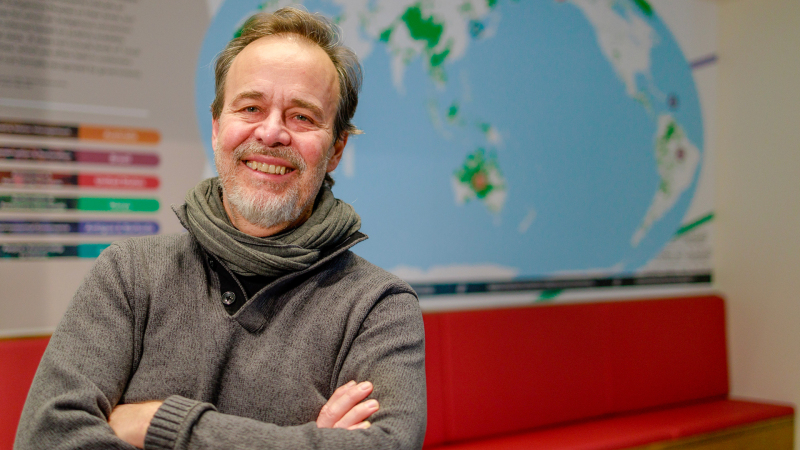
Argentine ecologist Sandra Díaz has been awarded the 2025 Tyler Prize for Environmental Achievement for her extraordinary work linking biodiversity to humankind, the Tyler Prize Executive Committee announced today.
"The World Academy of Sciences (TWAS) is delighted and so proud that Prof. Sandra Díaz, TWAS Fellow and current member of the TWAS Council representing Latin America and the Caribbean, is the 2025 Tyler Prize laureate, the world's highest recognition for contributions to Environmental Science,” said TWAS President Quarraisha Abdool Karim. “This underscores the high quality of science and innovation in the Global South that can address the wicked challenges facing us globally. Hearty and well-deserved congratulations to Prof. Díaz!"
Díaz won the award alongside her co-winner, Brazilian-American anthropologist Eduardo Brondízio. Together, they are using the win to draw attention to humanity’s “entanglement” with nature in a joint call for policies, business models, and individuals to acknowledge their dependence and shared responsibility in the “fabric of life.”
“The climatic crisis, the biodiversity crisis, and the outrageous socioeconomic inequities in the world are all interrelated, all connected by the living fabric of the planet,” the winners said in a joint statement. “They need to be tackled in an integrated manner. One cannot solve one of these crises without considering the other two. Solutions to them can enhance and synergize each other, while narrow- minded or short-sighted solutions to one of them can harm the others. Socio-environmental justice and respect for our connections with other life on Earth should stop being abstract concepts. They should be incorporated in policies, legislation, and initiatives from the public, civil society, and private sectors.”

Díaz, at the cutting edge of the interactions between biodiversity and humankind, is calling for respect for nature and its vital contributions to people to be embedded in all sectors of legislation and the economy. She also calls for an end to huge subsidies and financial incentives for activities that harm human and non-human life. Brondízio, an anthropologist at the forefront of interdisciplinary studies on the Amazon, is calling for a shift in how academics, decision-makers, and international climate and biodiversity financing view and engage with the Amazon.
The Tyler Prize Executive Committee awarded the USD $250,000 Prize to Díaz and Brondízio for their “commitment to understanding and addressing biodiversity loss and its impact on human societies.”
“Eduardo Brondízio's research has illuminated the vital role of Indigenous peoples and local communities in conservation, while Sandra Díaz's work has been instrumental in reshaping how biodiversity is conceptualized and valued in policy discussions around the globe,” said Julia Marton-Lefèvre, chair of the Tyler Prize.
The first individuals from South America to receive the Tyler Prize, Díaz and Brondízio worked together (with co-chair Josef Settele) on the Global Assessment Report of the Intergovernmental Science Policy Platform on Biodiversity and Ecosystems Services (IPBES), released in 2019, as well as the United Nations’ Convention on Biodiversity.
About Sandra Díaz
Sandra Díaz was elected a TWAS Fellow in 2010. Based in Argentina, she is a leading voice on ecology, having produced the global spectrum of plant form and function. This analysis represents the world’s first quantitative assessment of plant diversity—a term referring to traits that specifically affect responses to the environment and effects on the functioning of ecosystems. She has further built on this global picture to find out how different plant forms and functions relate to us and the rest of the world. She is heavily engaged in interdisciplinary work focused on how we value nature and how biodiversity decline affects different sectors of society. A professor of ecology at Córdoba National University in Argentina, and a senior member of Argentina’s National Research Council (CONICET), Díaz has received numerous prestigious awards and is a Martin School Fellow at Oxford University as well as a member of the Scientific Advisory Board for Independent Advice on Breakthroughs in Science and Technology to the Secretary General of the United Nations. Together with co-laureate Eduardo Brondízio and Josef Settele, she co-chaired the IPBES Global Assessment on Biodiversity and Ecosystem Services in 2019. Honored worldwide for her critical contributions to biodiversity, Díaz is a member of the Royal Society and the Academies of Sciences of Argentina, USA, France, Norway, and Latin America.

